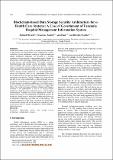| dc.contributor.author | Mnyawi, Richard | |
| dc.contributor.author | Kombe, Cleverence | |
| dc.contributor.author | Sam, Anael | |
| dc.contributor.author | Nyambo, Devotha | |
| dc.date.accessioned | 2023-11-01T07:56:48Z | |
| dc.date.available | 2023-11-01T07:56:48Z | |
| dc.date.issued | 2022-03 | |
| dc.identifier.uri | https://doi.org/10.22937/IJCSNS.2022.22.3.46 | |
| dc.identifier.uri | https://dspace.nm-aist.ac.tz/handle/20.500.12479/2391 | |
| dc.description | A research article was published by IJCSNS International Journal of Computer Science and Network Security, VOL.22 No.3, March 2022 | en_US |
| dc.description.abstract | Health information systems (HIS) are facing security challenges on data privacy and confidentiality. These challenges are based on centralized system architecture creating a target for malicious attacks. Blockchain technology has emerged as a trending
technology with the potential to improve data security. Despite the effectiveness of this technology, still HIS are suffering from a lack of data privacy and confidentiality. This paper presents a blockchain-based data storage security architecture integrated
with an e-Health care system to improve its security. The study employed a qualitative research method where data were collected using interviews and document analysis. Execute-order-validate Fabric’s storage security architecture was implemented through private data collection, which is the combination of the actual private data stored in a private state, and a hash of that private data to guarantee data privacy. The key findings of this research show that data privacy and confidentiality are attained through a private data policy. Network peers are decentralized with blockchain only for hash storage to avoid storage challenges. Cost-effectiveness is achieved through data storage within a database of a Hyperledger
Fabric. The overall performance of Fabric is higher than Ethereum. Ethereum’s low performance is due to its execute-validate
architecture which has high computation power with transaction inconsistencies. E-Health care system administrators should be
trained and engaged with blockchain architectural designs for health data storage security. Health policymakers should be aware of blockchain technology and make use of the findings. The scientific contribution of this study is based on; cost-effectiveness of secured data storage, the use of hashes of network data stored in each node, and low energy consumption of Fabric leading to high performance | en_US |
| dc.language.iso | en | en_US |
| dc.publisher | IJCSNS | en_US |
| dc.subject | Blockchain | en_US |
| dc.subject | Hyperledger Fabric | en_US |
| dc.subject | data storage security | en_US |
| dc.title | Blockchain-based Data Storage Security Architecture for e-Health Care Systems: A Case of Government of Tanzania Hospital Management Information System | en_US |
| dc.type | Article | en_US |

